From Reactive to Proactive: How AI Transforms Customer Support Strategies
Artificial Intelligence (AI) is revolutionizing customer support by shifting strategies from reactive to proactive approaches. This transformation enhances customer experiences, fosters loyalty, and drives operational efficiencies. In this article, we explore how AI achieves this shift, the benefits it offers, and how businesses can implement these changes effectively.
The Shift from Reactive to Proactive Support
Traditionally, customer support has been a reactive process. Customers reach out when they face issues, and support teams respond accordingly. This model often leads to frustration, as customers wait for solutions, and businesses miss opportunities to engage with their customers earlier in their journey. However, with advancements in AI, companies can now anticipate customer needs and address issues before they escalate.
Proactive support involves understanding customer behaviors and utilizing data analytics to predict potential issues. According to Deloitte, organizations are increasingly expanding their support to engage with customers early in their journey, enabling them to "understand, enable, work for, and support" customers more effectively. By using AI-driven insights, businesses can monitor customer interactions and identify patterns that indicate when issues may arise.
Benefits of Proactive Customer Support
Improved Customer Experience: Proactive support leads to faster resolutions and personalized experiences. When customers feel valued and understood, they are more likely to remain loyal to a brand. AI can analyze vast amounts of customer data, providing insights that enable support teams to tailor their interactions.
Reduced Operational Costs: Implementing AI solutions can help organizations reduce the workload on human agents by automating routine inquiries. Deloitte reports that AI can handle 40-60% of customer inquiries without escalation to human agents, allowing support teams to focus on more complex issues.
Increased Efficiency: AI tools can streamline support processes by offering self-service options and real-time recommendations. For instance, chatbots can provide instant responses to common queries, improving response times and customer satisfaction.
Data-Driven Insights: Proactive support utilizes data to drive decisions. By analyzing customer interactions, businesses can gain valuable insights into customer preferences, pain points, and behavior. This information allows companies to refine their services and offerings continually.
Implementing AI in Customer Support
To effectively transition from reactive to proactive support, organizations should consider the following strategies:
Invest in AI Technologies: Companies must adopt AI tools that facilitate proactive support. These can include chatbots, predictive analytics, and customer relationship management (CRM) systems that leverage AI for better insights.
Train Support Teams: While AI can automate many tasks, human agents remain essential. Training teams to work alongside AI tools ensures that they can provide empathetic and effective support when needed.
Create Feedback Loops: Implementing systems that allow for continuous feedback from customers can help businesses identify areas for improvement. Gathering insights on customer experiences can guide the development of more proactive strategies.
Monitor Performance Metrics: Establishing key performance indicators (KPIs) related to customer satisfaction and support efficiency can help businesses track the effectiveness of their proactive strategies. This monitoring will facilitate ongoing adjustments and enhancements.
Real-World Applications
Leading companies are already seeing success with proactive customer support strategies. For instance, organizations leveraging AI for early issue detection and resolution have reported significant improvements in customer satisfaction scores. By understanding customer journeys and employing data analytics, these companies have transitioned to more dynamic support models that not only resolve issues faster but also foster stronger customer relationships.
Conclusion
The transformation of customer support from a reactive to a proactive model is driven by AI technologies that enhance the customer experience, reduce costs, and improve operational efficiency. As businesses continue to embrace AI, they can better understand and anticipate customer needs, creating more engaging and satisfying interactions. For further insights into how AI is reshaping customer service, you can explore Deloitte's findings on the subject here.
By adopting these strategies, organizations can not only improve their customer support but also position themselves for long-term success in an increasingly competitive landscape.
For more resources on implementing AI in customer support, visit Deflekt.ai, which provides innovative solutions designed to enhance customer interactions and streamline support.
Additional Resources
Learn more about the impact of AI on customer support from Deloitte here.
Explore insights from Harvard on customer support transformation here.
This shift towards proactive customer support represents a significant opportunity for businesses to enhance their customer service and drive loyalty through innovative technology and strategic insights.
